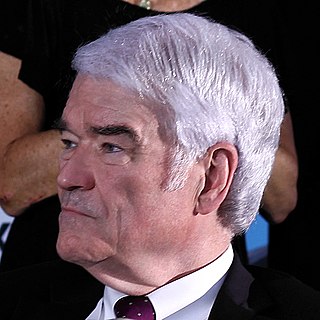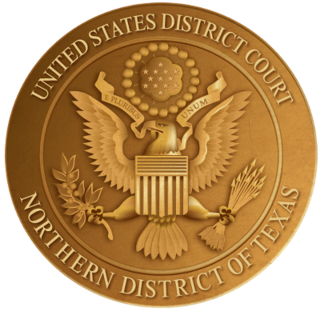
The chief justice of the United States is the chief judge of the Supreme Court of the United States and is the highest-ranking officer of the U.S. federal judiciary. Article II, Section 2, Clause 2 of the U.S. Constitution grants plenary power to the president of the United States to nominate, and, with the advice and consent of the United States Senate, appoint "Judges of the supreme Court", who serve until they die, resign, retire, or are impeached and convicted. The existence of a chief justice is only explicit in Article I, Section 3, Clause 6 which states that the chief justice shall preside over the impeachment trial of the president; this has occurred three times, for Andrew Johnson, Bill Clinton, and for Donald Trump’s first impeachment.

The Solicitor General of the United States, the fourth-highest-ranking official within the United States Department of Justice, represents the federal government in cases before the Supreme Court of the United States. The Solicitor General is appointed by the President and reports directly to the United States Attorney General.

The United States Court of Appeals for the Fifth Circuit is one of the 13 United States courts of appeals. It has appellate jurisdiction over the U.S. district courts in the following federal judicial districts:

The United States Court of Appeals for the Seventh Circuit is the U.S. federal court with appellate jurisdiction over the courts in the following districts:

The United States Court of Appeals for the District of Columbia Circuit is one of the thirteen United States Courts of Appeals. It has the smallest geographical jurisdiction of any of the U.S. courts of appeals, and it covers only one district court: the U.S. District Court for the District of Columbia. It meets at the E. Barrett Prettyman United States Courthouse in Washington, DC.
Van Orden v. Perry, 545 U.S. 677 (2005), is a United States Supreme Court case involving whether a display of the Ten Commandments on a monument given to the government at the Texas State Capitol in Austin violated the Establishment Clause of the First Amendment.

The United States District Court for the Western District of Texas is a federal district court. The court convenes in San Antonio with divisions in Austin, Del Rio, El Paso, Midland, Pecos, and Waco. It has jurisdiction in over 50 Trans-Pecos, Permian Basin, and Hill Country counties of the U.S. state of Texas. This district covers over 92,000 square miles (240,000 km2) and seven divisions.

Hernandez v. Texas, 347 U.S. 475 (1954), was a landmark case, "the first and only Mexican-American civil-rights case heard and decided by the United States Supreme Court during the post-World War II period." In a unanimous ruling, the court held that Mexican Americans and all other nationality groups in the United States have equal protection under the 14th Amendment of the U.S. Constitution. The ruling was written by Chief Justice Earl Warren. This was the first case in which Mexican-American lawyers had appeared before the Supreme Court.

The Supreme Court of Texas is the court of last resort for civil matters in the U.S. state of Texas. A different court, the Texas Court of Criminal Appeals, is the court of last resort in criminal matters.

Nathan Lincoln Hecht is the chief justice of the Supreme Court of Texas. A Republican from Dallas, Hecht was first elected to the Supreme Court in 1988 and was reelected to six-year terms in 1994, 2000 and 2006. He secured his fifth six-year term on November 6, 2012. He was appointed chief justice by Governor Rick Perry on September 10, 2013, and was sworn into that position by retiring Chief Justice Wallace B. Jefferson on October 1, 2013.

The United States District Court for the Northern District of Texas is a United States district court. Its first judge, Andrew Phelps McCormick, was appointed to the court on April 10, 1879. The court convenes in Dallas, Texas with divisions in Fort Worth, Amarillo, Abilene, Lubbock, San Angelo, and Wichita Falls. It has jurisdiction over 100 counties in the northern and central parts of the U.S. state of Texas.

The United States District Court for the Southern District of Texas is the federal district court with jurisdiction over the southeastern part of Texas. The court's headquarters is in Houston, Texas, and has six additional locations in the district.

The Texas Court of Criminal Appeals (CCA) is the court of last resort for all criminal matters in Texas. The Court, which is based in the Supreme Court Building in Downtown Austin, is composed of a presiding judge and eight judges.
The Texas Courts of Appeals are part of the Texas judicial system. In Texas, all cases appealed from district and county courts, criminal and civil, go to one of the fourteen intermediate courts of appeals, with one exception: death penalty cases. The latter are taken directly to the Texas Court of Criminal Appeals, the court of last resort for criminal matters in the State of Texas. The highest court for civil and juvenile matters is the Texas Supreme Court. While the Supreme Court (SCOTX) and the Court of Criminal Appeals (CCA) each have nine members per the Texas Constitution, the sizes of the intermediate courts of appeals are set by statute and vary greatly, depending on historical case filings and so that the justices on each court can timely adjudicate the volume of cases regularly before them. The total number of intermediate appellate court seats currently stands at 80, ranging from three, four, six, seven, nine, and thirteen (Dallas) per court.
SMU Dedman School of Law, commonly referred to as SMU Law School or Dedman School of Law, is a law school located in Dallas, Texas. It was founded in February 1925. SMU Law School is located on the campus of its parent institution, Southern Methodist University.
Elizabeth Bermingham Lacy is a Virginia jurist. She was the first woman named to the Virginia State Corporation Commission and later was the first woman named to be a justice of the Supreme Court of Virginia, where she served until her retirement in 2007.

The Supreme Court of the Republic of Texas was the court of last resort for legal matters in the Republic of Texas from the Republic's independence from Mexico in 1836 until its annexation by the United States of America in 1846. The current Supreme Court of Texas was established that year.
Carolyn Wright-Sanders is an American lawyer, jurist and a former Chief Justice of the Fifth Court of Appeals of Texas, serving in that position from November 17, 2009 to December 31, 2018.

Texas state elections in 2020 were held on Tuesday, November 3, 2020. Its primaries were held on March 3, 2020, with runoffs taking place on July 14.